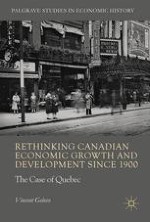
2017 | OriginalPaper | Buchkapitel
1. Introduction
verfasst von : Vincent Geloso
Erschienen in: Rethinking Canadian Economic Growth and Development since 1900
Aktivieren Sie unsere intelligente Suche, um passende Fachinhalte oder Patente zu finden.
Wählen Sie Textabschnitte aus um mit Künstlicher Intelligenz passenden Patente zu finden. powered by
Markieren Sie Textabschnitte, um KI-gestützt weitere passende Inhalte zu finden. powered by